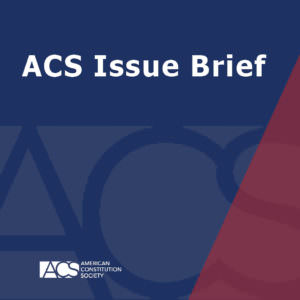The Democracy Restoration Act: Addressing A Centuries-Old Injustice
Senior Legislative Counsel, ACLU Washington Legislative Office
Program Officer, Civic Engagement and Government, Ford Foundation

ACS is pleased to distribute an Issue Brief by Deborah J. Vagins, Legislative Counsel for the Washington Legislative Office of the American Civil Liberties Union, and Erika Wood, Deputy Director of the Democracy Program at the Brennan Center for Justice at NYU School of Law, entitled “The Democracy Restoration Act: Addressing A Centuries-Old Injustice.” In this Issue Brief, Vagins and Wood discuss what they see as the next obstacle to overcome in expanding the right to vote as part of America's history of "successful struggles to expand the franchise to include those previously barred from the electorate because of race, class, or gender." According to the authors, "5.3 million American citizens are denied the right to vote because of criminal convictions." As Vagins and Wood point out, "[n]early 4 million of those who are disfranchised are out of prison, working, paying taxes, and raising families, yet they are without a voice" because they cannot fully participate in our democracy.
Vagins and Wood detail the roots of many disfranchisement laws that come from the Jim Crow era when they were designed to stop African Americans from voting. The authors note that the effects of these laws are still being felt today, pointing out that, “[n]ationwide, 13% of African American men have lost the right to vote as a result of a criminal conviction – a rate seven times the national average.” The laws regarding felon disfranchisement vary widely in different states, ranging from allowing prisoners to vote while they are in prison to permanently disfranchising people convicted of some crimes. The authors discuss this confusing patchwork of laws and how reform efforts have moved forward in some states, often with bipartisan and diverse support, while there has been no progress in other states, adding to the confusion for any person trying to figure out what his or her rights are. Vagins and Wood observe that, “[a] democracy’s strength is derived from broad civic engagement and election participation,” and point out that, “the United States is one of the few western democratic nations to exclude such large numbers of people from the democratic process.” The authors argue that this undermines our country’s ability to fully rehabilitate and reintegrate citizens returning from jail back into society. Last week, the U.S. House Judiciary Subcommittee on the Constitution, Civil Rights, and Civil Liberties, held a hearing on the Democracy Restoration Act, which is one solution to address the issues they discuss, and the authors conclude that it "must be enacted in order to restore voting rights to millions of American citizens in federal elections and to finally redress a centuries-old injustice."
Read the full Issue Brief here: The Democracy Restoration Act: Addressing A Centuries-Old Injustice
